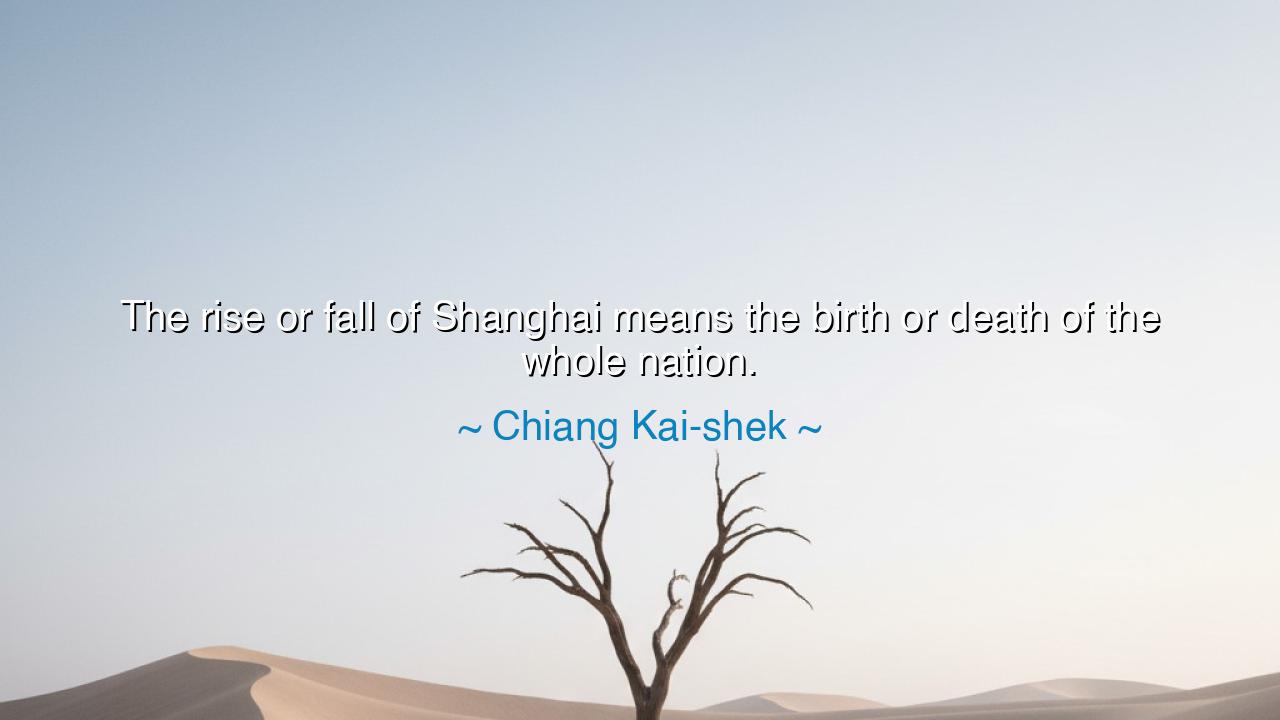
The rise or fall of Shanghai means the birth or death of the






“The rise or fall of Shanghai means the birth or death of the whole nation.” Thus spoke Chiang Kai-shek, the general and leader who once carried upon his shoulders the destiny of China during one of its most turbulent ages. His words resound not merely as a statement of strategy, but as a cry from the heart of a man who understood that certain cities are not built of stone alone—they are made of spirit, of industry, of the collective heartbeat of a people. To Chiang, Shanghai was not simply a port, not merely a city of commerce—it was the symbol of China’s vitality, the pulse by which the nation’s strength could be measured. Its rise meant renewal; its fall, calamity.
The origin of this quote lies in the grim days of the Second Sino-Japanese War, in the 1930s, when Shanghai stood as both a jewel and a battlefield. It was the gateway of China to the modern world—a city of trade, culture, and progress, the meeting point between East and West. Yet this same greatness made it vulnerable, a target for those who sought to dominate the nation. When Chiang Kai-shek uttered these words, he was not merely rallying troops—he was invoking a sacred duty. For to lose Shanghai would be to lose the heart of China’s modern soul; to defend it, no matter the cost, was to defend the spirit of the nation itself.
In August 1937, the Battle of Shanghai erupted—one of the fiercest and bloodiest battles of the early war. Chinese soldiers, many young and untrained, faced the modern machinery of the Japanese army. The city’s skyline became a theater of fire and ruin. Chiang Kai-shek, standing at the helm, believed that by fighting there, in the world’s gaze, China would prove its resolve to resist domination. “If Shanghai stands,” he reasoned, “China lives.” And though Shanghai eventually fell after months of brutal fighting, the world took notice. China’s courage, its refusal to yield, became the spark that inspired a prolonged resistance. Thus, even in defeat, Shanghai’s fall became the seed of China’s endurance.
Chiang’s statement carries a wisdom that transcends war. In every civilization, there are cities, institutions, and ideals that serve as the pillars of identity. When such a pillar collapses, the whole structure trembles. The fall of Athens broke the heart of Greece; the fall of Rome shattered the ancient world. Yet in each case, the idea—the essence of what those cities represented—continued in spirit through others who would rebuild. In Shanghai, Chiang saw that same essence. It represented not only economic strength but the soul of modern China—its youth, its innovation, its connection to the wider world. Thus, to fight for Shanghai was to fight for the future itself.
Yet there is a deeper meaning still. When Chiang speaks of the “rise or fall” of Shanghai, he speaks also of the rise or fall of any moral center, any vital force that sustains a people. A nation, like a human soul, has its heart—a place where its courage, creativity, and conscience dwell. If that heart weakens, the body follows. But if it beats strongly—if it refuses despair even in ruin—then the nation can survive anything. For a city may burn, but its spirit, if unyielding, becomes the flame that lights rebirth. This was the lesson of Shanghai, and through it, the lesson of China’s survival.
Consider, O listener, the rebuilding that came after the war—the rebirth of Shanghai from ashes. Its streets, once scarred by shells, again filled with merchants and dreamers, poets and engineers. Where foreign powers once imposed their will, now rose towers built by the hands of its own people. Shanghai, like the phoenix of legend, proved that the death of the flesh need not mean the death of the soul. In this, Chiang’s prophecy came full circle: though the city had fallen, its rebirth became a sign that the nation, too, would rise again.
So take this teaching into your own heart: the fate of any great endeavor—be it a city, a nation, or a life—rests upon the strength of its core, its purpose, its heart. When that heart is neglected, when its people lose faith, decline follows swiftly. But when men and women stand firm in loyalty, courage, and vision, even ruin cannot destroy them. As Shanghai fell and rose again, so too can each of us endure the storms of our own lives. Protect what is vital within you—your integrity, your dreams, your hope—as a general protects his capital. For the rise or fall of your inner strength will determine the birth or death of all that you strive for.
Thus, let Chiang Kai-shek’s words echo beyond history: “The rise or fall of Shanghai means the birth or death of the whole nation.” For every generation, in every land, there lies a Shanghai of the soul—a place of struggle, pride, and destiny. Guard it well, build it bravely, and let it rise—for upon its strength rests the life of all that you are.






AAdministratorAdministrator
Welcome, honored guests. Please leave a comment, we will respond soon